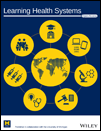
Learning Health Systems
Scope & Guideline
Exploring the future of health through collaborative research.
Introduction
Aims and Scopes
- Learning Health Systems Development:
Research on the design, implementation, and evaluation of learning health systems that facilitate continuous learning and improvement in healthcare practices. - Public Health Integration:
Studies focusing on the intersection of learning health systems and public health, emphasizing community engagement and the utilization of data for evidence-based public health interventions. - Data-Driven Decision Making:
Exploration of methodologies for leveraging health data, including electronic health records and patient-reported outcomes, to inform clinical practices and policy. - Collaboration and Stakeholder Engagement:
Research on the role of collaboration among healthcare providers, researchers, and patients in fostering effective learning health systems. - Health Equity and Access:
Investigations into how learning health systems can be utilized to address disparities in healthcare access and outcomes, promoting equity in health services. - Innovative Technologies in Healthcare:
Examination of emerging technologies, including artificial intelligence and telehealth, and their impact on learning health systems and patient care.
Trending and Emerging
- Integration of Artificial Intelligence:
An increasing number of studies are examining the role of AI in enhancing healthcare delivery, decision-making, and patient engagement within learning health systems. - Community Engagement and Co-Design:
There is a growing emphasis on community-led approaches and participatory research, highlighting the importance of authentic collaboration with community organizations in health system transformation. - Real-World Evidence Generation:
Research focused on generating real-world evidence through learning health systems methodologies is trending, emphasizing the importance of practical applications in clinical settings. - Focus on Health Equity:
Emerging themes increasingly address health equity, exploring how learning health systems can be leveraged to reduce disparities and improve access to care for marginalized populations. - Adaptive Learning and Continuous Improvement:
There is a strong trend towards studies that promote adaptive learning models, which allow healthcare organizations to continuously improve practices based on real-time data and feedback.
Declining or Waning
- Traditional Clinical Trials:
There is a noticeable decline in studies focused on conventional clinical trial methodologies, as the journal increasingly emphasizes learning health systems that prioritize real-world evidence and rapid learning. - Static Healthcare Models:
Research centered on static, non-adaptive healthcare models has waned, giving way to dynamic, learning-oriented approaches that accommodate ongoing changes in healthcare delivery. - Siloed Research Approaches:
The focus on isolated research initiatives is decreasing, as the journal promotes integrated, collaborative strategies that leverage shared knowledge across disciplines and stakeholders. - Top-Down Implementation Strategies:
There is a reduced emphasis on top-down approaches in health system changes, with a growing recognition of the importance of grassroots, community-led initiatives in shaping health policies and practices.
Similar Journals

BMJ Health & Care Informatics
Connecting Research and Practice in Health Care InformaticsBMJ Health & Care Informatics, published by the esteemed BMJ Publishing Group, stands at the forefront of the rapidly evolving field of health informatics. Established as an Open Access journal in 2019, it is dedicated to disseminating high-quality research that enhances the integration of health care with information technologies. With a prominent Q1 ranking in 2023 across categories such as Computer Science Applications, Health Informatics, and Health Information Management, this journal serves as an essential resource for researchers and practitioners alike. The journal is indexed in reputable databases and boasts impressive Scopus ranks—notably, it is placed #43 among Health Informatics journals. The aim is to foster innovation and understanding in health care practices through rigorous research and collaboration. Encompassing a wide spectrum of topics within health data science, usability, and outcomes research, BMJ Health & Care Informatics is pivotal for anyone involved in advancing health care through technology.

TECHNOLOGY AND HEALTH CARE
Enhancing Lives: The Technology-Healthcare ConnectionTECHNOLOGY AND HEALTH CARE, published by IOS PRESS, stands as a prominent interdisciplinary journal dedicated to the integration of technology within the healthcare sector. With an ISSN of 0928-7329 and an E-ISSN of 1878-7401, this journal has been a vital resource since its inception in 1993, providing insights and advancements in various categories including bioengineering, biomedical engineering, health informatics, and more. Though it currently holds a Q4 classification in several fields and Q3 in others, it actively contributes to the dialogue surrounding innovative methodologies and practices that enhance healthcare delivery. Researchers, professionals, and students will find the journal invaluable for its diverse range of studies that explore the convergence of technology and health. Its commitment to fostering impactful research continues to reinforce its relevance in the evolving landscape of healthcare technology.

INFORMATION RESEARCH-AN INTERNATIONAL ELECTRONIC JOURNAL
Transforming Information Research for Tomorrow's Scholars.INFORMATION RESEARCH - AN INTERNATIONAL ELECTRONIC JOURNAL is a distinguished open-access journal published by the University of Sheffield's Department of Information Studies, situated in England. Since its inception in 1995, the journal has been at the forefront of disseminating research findings in the field of Library and Information Sciences, earning a commendable Q2 ranking in the category for 2023. With an ISSN of 1368-1613 and an E-ISSN of 1368-1613, it serves as a vital resource for scholars, practitioners, and students alike, providing a platform for innovative insights and engaging discussions. The journal accepts submissions from diverse perspectives related to the information research domain and contributes to the ongoing dialogue among academic professionals worldwide. With a Scopus ranking placing it at 150 out of 280 in its field, this publication underscores its importance in shaping the future of information studies while enabling wide accessibility to cutting-edge research.
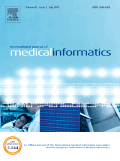
INTERNATIONAL JOURNAL OF MEDICAL INFORMATICS
Elevating Patient Outcomes Through Informatic SolutionsInternational Journal of Medical Informatics, published by Elsevier Ireland Ltd, is a premier peer-reviewed journal dedicated to advancing the field of health informatics. Established in 1997, this journal has consistently strived to disseminate high-quality research and innovative practices, now recognized in the Q1 quartile of health informatics for 2023, ranking impressively at #24 out of 138 in Scopus. The journal's focus encompasses the integration of computer science and information technology in healthcare, fostering discussions on data management, telemedicine, health information systems, and decision support mechanisms. With an ISSN of 1386-5056 and E-ISSN of 1872-8243, it provides options for both subscription and open access, ensuring broad dissemination of research findings. As a vital resource for researchers, professionals, and students in the rapidly evolving domain of medical informatics, the International Journal of Medical Informatics is positioned to be at the forefront of knowledge translation in the health sector, contributing significantly to improvements in patient care and healthcare delivery.
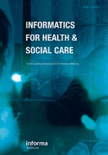
Informatics for Health & Social Care
Transforming health through innovative informatics.Informatics for Health & Social Care is a leading journal published by Taylor & Francis Inc, dedicated to the intersection of health informatics and social care. With a strong emphasis on advancing knowledge in the fields of health information management and nursing, this journal has established itself as a vital resource for researchers and professionals seeking to explore innovative applications of informatics to improve patient outcomes and streamline healthcare delivery. Recognized for its influential contributions, it currently holds a Q2 ranking in both Health Informatics and Health Information Management, as well as a prestigious Q1 ranking in Nursing (miscellaneous) for 2023, signifying its critical role within the academic community. The journal is accessible for open access viewing, fostering a broader dissemination of research findings. Released continuously since 1976, it stands as a testament to the evolving landscape of health informatics, addressing pertinent issues and facilitating discussions that shape practices in health and social care delivery.
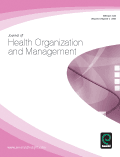
Journal of Health Organization and Management
Advancing health management through research and innovation.The Journal of Health Organization and Management, published by Emerald Group Publishing Ltd, serves as a pivotal resource for professionals, researchers, and students interested in the intersection of health policy and organizational effectiveness. With an ISSN of 1477-7266 and an E-ISSN of 1758-7247, this esteemed journal has been charting advancements in health management since 2003, showcasing articles that reflect rigorous research and the latest trends in the field. Hailing from the United Kingdom, the journal has established itself within the upper echelons of academic literature, currently enjoying a Q2 classification in notable categories, including Business, Management, and Accounting, Health Policy, and Organizational Behavior and Human Resource Management, as of 2023. With impressive rankings in Scopus, including a percentile rank in the 62nd for Business and Management, it is an essential platform for disseminating innovative ideas and evidence-based findings crucial for enhancing health care systems globally. While it operates under a conventional access model, the journal remains dedicated to fostering scholarly dialogue and advancing the understanding of health organization complexities.
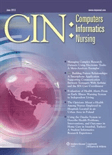
CIN-COMPUTERS INFORMATICS NURSING
Advancing Nursing Through Innovative InformaticsCIN-COMPUTERS INFORMATICS NURSING is a distinguished journal that publishes cutting-edge research at the intersection of nursing and information technology. Published by Lippincott Williams & Wilkins, the journal has been a pivotal platform since 2002, catering to the needs of health informatics professionals and nursing researchers. With an impressive impact factor and ranked within Q2 in Nursing (miscellaneous) and other relevant categories, it serves as a key resource for advancing knowledge and best practices in the field. The journal's inclusion in important databases ensures broad visibility and access to the latest findings that influence healthcare delivery. CIN-COMPUTERS INFORMATICS NURSING welcomes a diverse range of articles, including empirical studies, reviews, and innovative methodology approaches, making it an invaluable asset for clinicians, educators, and scholars dedicated to enhancing nursing informatics and improving patient outcomes.
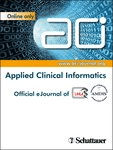
Applied Clinical Informatics
Empowering clinical excellence with technology-driven insights.Applied Clinical Informatics is a leading journal dedicated to the expanding field of health informatics and its applications within clinical settings. Published by GEORG THIEME VERLAG KG in Germany, this journal serves as a pivotal platform for researchers and professionals engaged in the integration of technology and healthcare, aiming to improve patient outcomes through innovative informatics solutions. With a solid Q2 ranking in multiple disciplines including Computer Science Applications, Health Informatics, and Health Information Management, it reflects its prominent position in the academic landscape. The journal provides accessible content while fostering dialogue on key issues and advancements in clinical informatics. Covering a wide array of topics from data management to e-health applications, Applied Clinical Informatics is essential reading for those looking to stay attuned to the latest research and developments from 2009 to 2024, enriching the knowledge base of students, professionals, and researchers worldwide.

Risk Management and Healthcare Policy
Fostering collaboration for a resilient healthcare future.Risk Management and Healthcare Policy is an esteemed Open Access journal published by DOVE MEDICAL PRESS LTD, dedicated to advancing the fields of health policy and public health. Established in 2008, the journal fosters a rich dialogue among researchers, professionals, and students, focusing on innovative strategies for managing risks within healthcare systems. With a current impact factor reflected in its robust Scopus rankings—placing it in the top quartile (Q2) in both Health Policy and Public Health, Environmental and Occupational Health—the journal is a pivotal resource that shares critical insights and evidence-based practices. The journal not only covers empirical studies and analytical research but also promotes discussions on emerging challenges and opportunities within the healthcare sector. As a result, Risk Management and Healthcare Policy serves as a vital platform for disseminating high-quality research, fostering collaboration, and informing policy decisions aimed at enhancing health outcomes globally.

JOURNAL OF TELEMEDICINE AND TELECARE
Connecting knowledge to enhance global healthcare delivery.JOURNAL OF TELEMEDICINE AND TELECARE, published by SAGE PUBLICATIONS LTD, stands at the forefront of the rapidly evolving fields of health informatics and telemedicine. With its ISSN 1357-633X and E-ISSN 1758-1109, this prestigious journal has been a vital platform for innovation and research since its inception in 1995, covering a wide array of topics from remote patient monitoring to the integration of artificial intelligence in healthcare delivery. Recognized for its rigorous academic standards, the journal boasts an impressive impact factor, positioning it in the Q1 quartile for Health Informatics and securing a remarkable rank of #9 out of 138 in Scopus, placing it in the 93rd percentile among its peers. By disseminating high-quality research, the JOURNAL OF TELEMEDICINE AND TELECARE contributes significantly to the advancement of knowledge, shaping best practices in telehealth and enhancing patient care worldwide. As a non-open access journal, it appeals to a broad audience of researchers, healthcare professionals, and students, facilitating critical discourse on the future of healthcare technology. Stay at the forefront of this essential domain by engaging with the latest findings and projects featured in this influential publication.